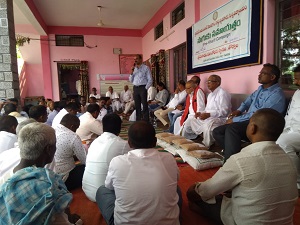Saguku Samayatham (2019) at Irkode village by ARS, Tornala on 24-06-2019
A programme on Saguku Samayatham was organized by ARS, Tornala at Gram Panchayath building of Irkode village, Siddipet rural mandal, Siddipet district on 24-06-2019. Dr. P. Jagan Mohan Rao, ADR, RARS, Warangal was the Chief Guest and Mr. M. Ravindar Reddy, SUDA Chairman, Siddipet was the Guest of Honour of the programme. The meeting was organized by Ms. E. Umarani, Scientist (Pl. Br.), Ms. D. Swetha, Scientist (Agro.) and Dr. A.V. Ramanjaneyulu, Sr. Scientist (Agro) & Head, ARS, Tornala. Other scientists Dr. S. Sridevi, Principal APT, Tornala, Dr. B. Ramprasad, Sr. Scientist (Ento.), RARS, Warangal, Dr. Chaitanya, Scientist (Hort.), WTC, Rajendranagar, officers from Agriculture and Horticulture Department and representatives from Rythu Samanvaya Samithi and 69 farmers from the village have participated in the programme.
Dr. A.V. Ramanjaneyulu, Sr. Scientist (Agro.) & Head, ARS, Tornala gave a brief account on the objectives of the meeting with main emphasis on selection of crops/varieties based on soil, water resources and rainfall. Dr. B. Ramprasad gave a detailed account of control measures to be taken against different pests and diseases in response to the queries raised by farmers, as furnished below.
Fall army worm in maize
- Seed treatment with Fortenza (Thiomethaxam +Cynatraniliprole) @ 4 ml/kg
- Installation of pheromone traps (4-8/acre) immediately after sowing
- Application of lime+sand (1:9) ratio in the leaf whorls
- Spraying of Azadirachtin 1500 ppm @ 5 ml/lit or Chlorpyriphos @ 2.5 ml/lit or Spinosad @ 0.3 ml/lit or Emamectin benzoate @ 0.4 ml/lit or Spinetoram @ 0.5 ml/lit starting from one week after germination, depending on the severity
Pink boll worm in cotton
- Use of the short and medium duration cultivars
- Installation of pheromone traps at 40-45 DAS @ 4-8/acre
- Spraying of 5 % NSKE or neem oil@5 ml/lit during evenings to destruct the egg masses followed by Quinolphos @ 2 ml/lit or Thiodicarb@1.5 g/lit or Profenofos@ 2 ml/lit or Chloripyrifos@2.5 ml/lit depending on the severity
Viral disease in vegetables
- Crop rotation
- Addition of neem cake at the time of land preparation (150-200 kg/acre)
- Seed treatment with Imidachloprid @ 5 ml/lit followed by Pseudomonas florescence @ 5g/kg
- Need based spraying of 5 % NSKE or neem oil @ 5 ml/lit
Dr. Chaitanya guided the farmers about growing season, selection of seed material, raising nursery, water management techniques and plant protection aspects in cultivation of vegetables. Dr. S. Sridevi explained the importance of IFS modules for generation of year round employment and income.
Later, Dr. P. Jaganmohan Rao, gave following suggestions to the farmers
- Sow rainfed crops only after receipt of cumulative rainfall of 60-70 mm
- Use of short duration and wilt resistant varieties in redgram
- Redgram as an intercrop in all rainfed crops in the ratio 1:4-5
- Ridge and furrow method of land configuration for better moisture conservation in all rainfed crops
- Foliar spray of Multi-K (1%) or 19-19-19 @ 1% during dryspells
- One or two life saving irrigations through furrow or alternate furrow or sprinkler method in the event of dryspells
At the end, the seeds of paddy minikit varieties viz., RNR 15435 and WGL 962 were distributed to the farmers on the hands of Dr. P. Jaganmohan Rao garu and Mr. M. Ravindar Reddy garu.
